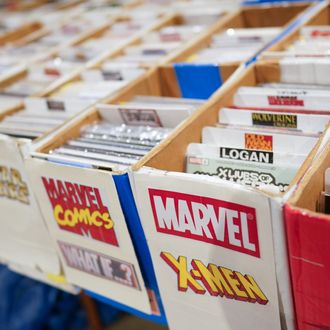
Comics creators have had enough. A collection of comic and cartoon professionals are sharing personal accounts to expose their industry for its appalling working conditions, which include inhuman hours, meager pay, and rampant job insecurity. The #ComicsBrokeMe Twitter conversation is seemingly in reaction to the death of artist Ian McGinty (Adventure Time, Invader Zim). McGinty died on June 8 at the age of 38, and some speculate the difficult reality of working in comics may have been a contributing factor. Now, major players in the comics field are sharing distressing stories about their time in the industry and some are calling for action.
Multiple artists have accused DC and Marvel of paying terrible rates — which is rich considering the companies’ IPs take home billions at the box office. “When I started in comics in 1987 DC Comics was paying me $40 a page for a 24-page comic,” The Sandman’s Neil Gaiman tweeted. “That’s worth somewhere between $120 and $160 now (and by issue 8 Sandman was making the same again each month in Royalties).” Kurt Busiek replied that he got “$50 page for MARVELS.” Gaiman lamented the current state of the industry’s standard compensation. “How anyone survives on [the] current page rates leaves me chilled.”
Meanwhile, artist Kwanza Osajyefo claimed DC used dishonest practices to draw creators. “While DC had me lying to some creators to get them working for less than their average page rate, I signed vouchers to high-profile writers for $10,000 per issue,” he alleged. A creator at Marvel accused her employer of astounding pay gaps, too. “As an assistant editor I would sign vouchers for talent who made more for a single issue than Marvel would pay me a year. A YEAR,” Heather Antos claimed. Daredevil’s Peter Krause said his page rate between two Marvel projects went down — even though the previous one was nominated for an Eisner Award. “Ahoy Comics pays me better than Marvel,” Krause tweeted.
Even acclaimed comics struggle under the current system. Comic David Lasky said his 200-page award-winning historical graphic novel, published by Harry N. Abrams, earned him a paltry $19,000 over the three and a half years it took to produce, a sum split between him and his co-writer Frank M. Young. “Why have I not created a follow-up book? Well, after finishing our book, my co-author and I were broke,” Lasky wrote. “I went back to work for a bakery. My co-author was homeless for a while. Our GN didn’t make us royalties.” Chris Fenoglio, who worked on franchises like X-Men, concurred regarding the question of royalties. “Licensed comics don’t pay royalties. Like, ever,” he tweeted. “I did a book for Scholastic and got offered a second book and turned it down because they ‘couldn’t’ get me even a marginal amount of royalty pay.” Those who do receive royalties find that the payments are very little. Justin Giampaoli earned just $1,703 in royalties in 2021, according to his tweet.
“I remember staying up for 37 hours straight to finish [a] 22-page issue,” tweeted Chris Kindred, a Brooklyn-based illustrator whose clients include The New Yorker, The Atlantic, and the Washington Post. He was recounting a time in 2015 when he got a coloring gig at BOOM! Studios, a company known for Keanu Reeves’s BRZRKR and established licenses with Dune and Buffy the Vampire Slayer. “I was having heart flutters, I was dehydrated, I was falling asleep over my school’s Cintiq. I hated the work I turned in. When I woke up and saw that I was cut loose, something in me broke.” A different artist, Corey Brickley, alleged being overworked by a tabletop company. “I busted my ass and didn’t sleep for two days,” he wrote. “They responded with a bunch of hand wringing, bs and a kill fee, and I promised myself I’d never bust my ass like that for a client again.”
Freelance illustrator Chris Sotomayor’s health deteriorated due to working conditions. “I got some stories too,” he tweeted. “Like when I was overworked and wound up in the hospital for 3 weeks. One of which was in a coma. When I got out, my editor fired me, even though I got my work in before I was hospitalized.”
Cartoonist Cooperative, an organization committed to making comic pay rates livable and equitable, is encouraging the collective action. “It does all come back to publishers, and how capitalism doesn’t value artists,” the group said in a statement posted to Twitter using #ComicsBrokeMe. “As long as cartoonists are paid the same low rates for pages — if not worse — than they were 20–30 years ago, comics are broken. The fact that working in comics is mostly considered contract/freelance work is by design: it limits access to health benefits and inhibits artists from rallying together.” In the meantime, artist Rachel Distler has started a survey to track comics’ pay and working conditions. “I haven’t had hot water in my house for two and a half years,” she tweeted. “I’m not #ComicsBrokeMe, yet, but I feel dangerously on track towards that and more most days.”


